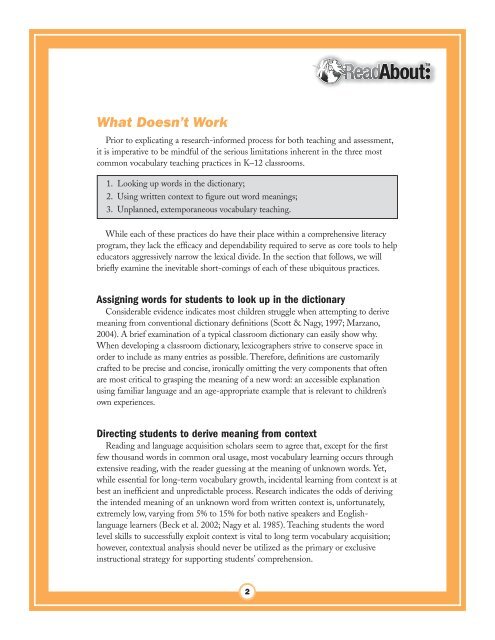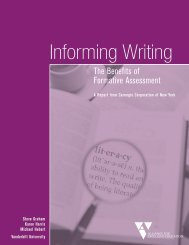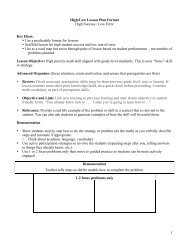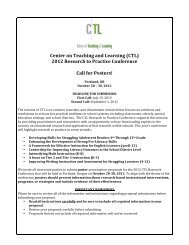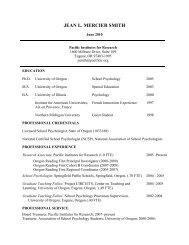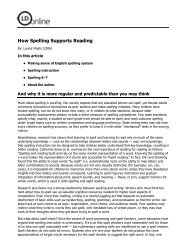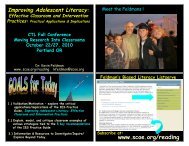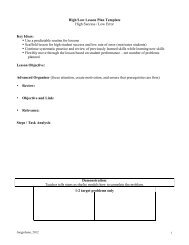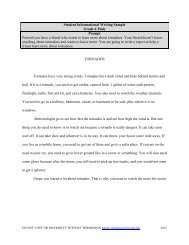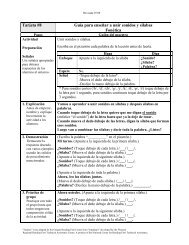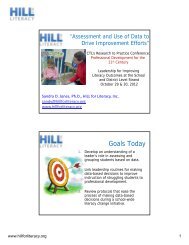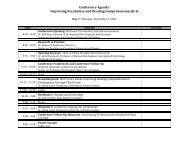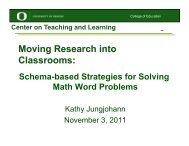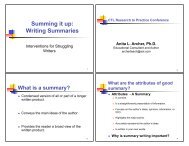Narrowing the Language Gap: - Center on Teaching and Learning ...
Narrowing the Language Gap: - Center on Teaching and Learning ...
Narrowing the Language Gap: - Center on Teaching and Learning ...
- No tags were found...
Create successful ePaper yourself
Turn your PDF publications into a flip-book with our unique Google optimized e-Paper software.
TMWhat Doesn’t WorkPrior to explicating a research-informed process for both teaching <strong>and</strong> assessment,it is imperative to be mindful of <str<strong>on</strong>g>the</str<strong>on</strong>g> serious limitati<strong>on</strong>s inherent in <str<strong>on</strong>g>the</str<strong>on</strong>g> three mostcomm<strong>on</strong> vocabulary teaching practices in K–12 classrooms.1. Looking up words in <str<strong>on</strong>g>the</str<strong>on</strong>g> dicti<strong>on</strong>ary;2. Using written c<strong>on</strong>text to figure out word meanings;3. Unplanned, extemporaneous vocabulary teaching.While each of <str<strong>on</strong>g>the</str<strong>on</strong>g>se practices do have <str<strong>on</strong>g>the</str<strong>on</strong>g>ir place within a comprehensive literacyprogram, <str<strong>on</strong>g>the</str<strong>on</strong>g>y lack <str<strong>on</strong>g>the</str<strong>on</strong>g> efficacy <strong>and</strong> dependability required to serve as core tools to helpeducators aggressively narrow <str<strong>on</strong>g>the</str<strong>on</strong>g> lexical divide. In <str<strong>on</strong>g>the</str<strong>on</strong>g> secti<strong>on</strong> that follows, we willbriefly examine <str<strong>on</strong>g>the</str<strong>on</strong>g> inevitable short-comings of each of <str<strong>on</strong>g>the</str<strong>on</strong>g>se ubiquitous practices.Assigning words for students to look up in <str<strong>on</strong>g>the</str<strong>on</strong>g> dicti<strong>on</strong>aryC<strong>on</strong>siderable evidence indicates most children struggle when attempting to derivemeaning from c<strong>on</strong>venti<strong>on</strong>al dicti<strong>on</strong>ary definiti<strong>on</strong>s (Scott & Nagy, 1997; Marzano,2004). A brief examinati<strong>on</strong> of a typical classroom dicti<strong>on</strong>ary can easily show why.When developing a classroom dicti<strong>on</strong>ary, lexicographers strive to c<strong>on</strong>serve space inorder to include as many entries as possible. Therefore, definiti<strong>on</strong>s are customarilycrafted to be precise <strong>and</strong> c<strong>on</strong>cise, ir<strong>on</strong>ically omitting <str<strong>on</strong>g>the</str<strong>on</strong>g> very comp<strong>on</strong>ents that oftenare most critical to grasping <str<strong>on</strong>g>the</str<strong>on</strong>g> meaning of a new word: an accessible explanati<strong>on</strong>using familiar language <strong>and</strong> an age-appropriate example that is relevant to children’sown experiences.Directing students to derive meaning from c<strong>on</strong>textReading <strong>and</strong> language acquisiti<strong>on</strong> scholars seem to agree that, except for <str<strong>on</strong>g>the</str<strong>on</strong>g> firstfew thous<strong>and</strong> words in comm<strong>on</strong> oral usage, most vocabulary learning occurs throughextensive reading, with <str<strong>on</strong>g>the</str<strong>on</strong>g> reader guessing at <str<strong>on</strong>g>the</str<strong>on</strong>g> meaning of unknown words. Yet,while essential for l<strong>on</strong>g-term vocabulary growth, incidental learning from c<strong>on</strong>text is atbest an inefficient <strong>and</strong> unpredictable process. Research indicates <str<strong>on</strong>g>the</str<strong>on</strong>g> odds of deriving<str<strong>on</strong>g>the</str<strong>on</strong>g> intended meaning of an unknown word from written c<strong>on</strong>text is, unfortunately,extremely low, varying from 5% to 15% for both native speakers <strong>and</strong> Englishlanguagelearners (Beck et al. 2002; Nagy et al. 1985). <strong>Teaching</strong> students <str<strong>on</strong>g>the</str<strong>on</strong>g> wordlevel skills to successfully exploit c<strong>on</strong>text is vital to l<strong>on</strong>g term vocabulary acquisiti<strong>on</strong>;however, c<strong>on</strong>textual analysis should never be utilized as <str<strong>on</strong>g>the</str<strong>on</strong>g> primary or exclusiveinstructi<strong>on</strong>al strategy for supporting students’ comprehensi<strong>on</strong>.2


